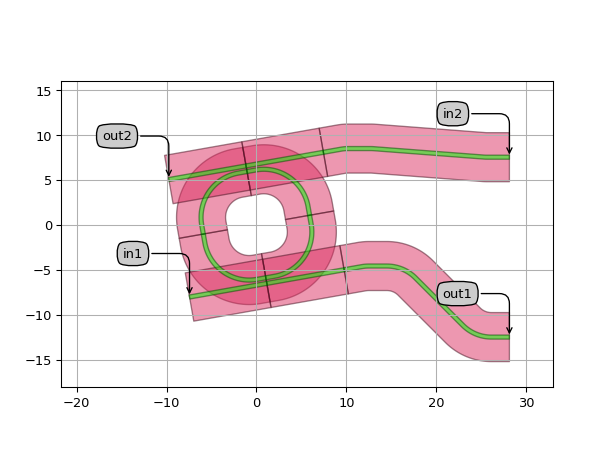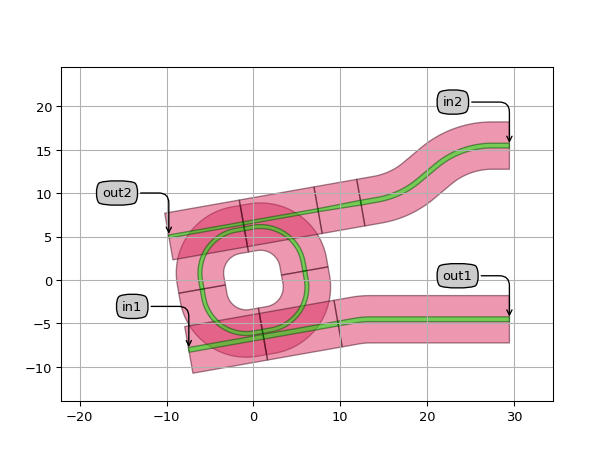FanoutPorts
- class picazzo3.container.fanout_ports.FanoutPorts
Fanout Container. Routes all ports listed in
port_labelsinto a given direction, with a given spacing. This is typically used to redirect a set of ports on a component to a regularly spaced array of ports. The user can use this to convert from one input/output waveguide pitch to another, or from irregular input/output waveguide positioning to a regular pitch.If
port_labelsis not specified, all ports will be routed.By default, the default waveguide template specified in the technology, TECH.PCELLS.WG.DEFAULT, will be used. This can be overridden by setting trace_template=None, in which case the trace templates of the ports of the contents will be used.
- Parameters:
- trace_template: ( PCell and _WaveguideTemplate ), *None allowed*
Template for all ports, defaults to TECH.PCELLS.WG.DEFAULT.When set to None, the waveguide templates of the ports will be used.
- auto_transition:
If True, automatically transition all ports of contents to the given trace template. If False, no transitions are applied, which might lead to a discontinuity in the waveguide. Also, if trace_template is None, no transitions are applied.
- port_labels: ( List with type restriction, allowed types: <class ‘str’> ), *None allowed*
Labels of the ports to be processed. Set to None to process all ports.
- external_port_names: str
Dictionary for remapping of the port names of the contents to the external ports
- contents: PCell
the contents of the container: the child cell
- name: String that contains only ISO/IEC 8859-1 (extended ASCII py3) or pure ASCII (py2) characters
The unique name of the pcell
- Other Parameters:
- bundle: ( PCell ), locked, *None allowed*
bundle of waveguides added to the contents, generated based on the supplied waveguides list
- waveguides: List with type restriction, allowed types: <class ‘ipkiss3.pcell.cell.pcell.PCell’>, locked
- trace_templates: List with type restriction, allowed types: <class ‘ipkiss3.pcell.cell.pcell.PCell’>, locked
list of templates to apply to all ports
Views
- class Layout
- Parameters:
- target_coordinate: ( float ), *None allowed*
The coordinate where the endpoints of the waveguides are aligned. An x-coordinate when routing toEAST or WEST, a y-coordinate when routing to NORTH or SOUTH. When the waveguides extend beyond thetarget coordinate, the value is ignored.
- max_s_bend_angle: float and ]0.0,90.0]
- spacing: float
spacing between adjacent output waveguides
- align_outputs:
If True, all outputs will be aligned to the outermost waveguide end, even if it extends beyond its target coordinate.
- reference_coordinate: ( float ), *None allowed*
The coordinate where the first waveguide will be aligned. An x-coordinate if routed towards NORTH or SOUTH,a y-coordinate when routed towards EAST or WEST. If not specified, the x or y coordinate of the first port is taken.
- output_direction: List with value restriction, allowed values: [C2(1.000000, 0.000000), C2(-1.000000, 0.000000), C2(0.000000, 1.000000), C2(0.000000, -1.000000)]
direction of the output waveguides. Should be EAST, WEST, NORTH or SOUTH
- area_layer_on:
When True, the waveguide area will be covered by i3.Rectangles on all cover layers.
- routes:
routes along which the waveguides will be generated
- contents_transformation: GenericNoDistortTransform
transformation to apply to the contents
- flatten_contents:
if True, it will insert the contents as elements in the layout, rather than as an Instance
- view_name: String that contains only alphanumeric characters from the ASCII set or contains _$. ASCII set is extended on PY3.
The name of the view
- manhattan:
Adds rectangular blocks in the bends to avoid as much as possible non-manhattan angles.
- angle_step: float and number > 0
Angle step for rounding.
- rounding_algorithm:
Rounding algorithm used to generate the bends. Can be circular, spline, ….
- bend_radius: float and number > 0
Bend radius for the auto-generated bends.
- Other Parameters:
- target_coordinates: locked
- max_s_bend_angles: locked
- spacings_from_reference: locked
Examples
import si_fab.all as pdk # noqa: F401 from picazzo3.filters.ring import RingRect180DropFilter from picazzo3.container.fanout_ports import FanoutPorts from ipkiss3 import all as i3 my_ring = RingRect180DropFilter() my_ring.Layout() my_ring_fanout = FanoutPorts(contents=my_ring, port_labels=["E0", "E1"]) lay = my_ring_fanout.Layout( contents_transformation=i3.Rotation(rotation=10.0), flatten_contents=False, area_layer_on=False, # if True, adds area layer on the bundle output_direction=i3.EAST, spacing=20.0, # spacing between outputs reference_coordinate=-12.5, # y-coordinate (or x for NORTH and SOUTH) of first waveguide target_coordinate=20.0, # x-coordinate (or y for NORTH and SOUTH) of output port max_s_bend_angle=45.0, # maximum angle of S-bend bend_radius=4.5, # bend radius of waveguides ) lay.visualize(annotate=True)

import si_fab.all as pdk # noqa: F401 from picazzo3.filters.ring import RingRect180DropFilter from picazzo3.traces.wire_wg import WireWaveguideTemplate from picazzo3.container.fanout_ports import FanoutPorts from ipkiss3 import all as i3 wg_t1 = WireWaveguideTemplate() wg_t1.Layout(core_width=0.55) wg_t2 = WireWaveguideTemplate() wg_t2.Layout(core_width=0.35) my_ring = RingRect180DropFilter(name="ring_for_fanout", coupler_trace_templates=[wg_t1, wg_t2]) my_ring.Layout() my_ring_fanout = FanoutPorts( contents=my_ring, port_labels=["E0", "E1"], trace_template=wg_t1, auto_transition=True, # this adds transitions when the waveguide templates don't match. ) layout = my_ring_fanout.Layout( contents_transformation=i3.Rotation(rotation=10.0), flatten_contents=False, area_layer_on=False, # draws a cover layer between the waveguides output_direction=i3.DIRECTION.EAST, spacing=20.0, # spacing between outputs max_s_bend_angle=60.0, # maximum angle of S-bend bend_radius=10.0, # bend radius of waveguides ) layout.visualize(annotate=True)
